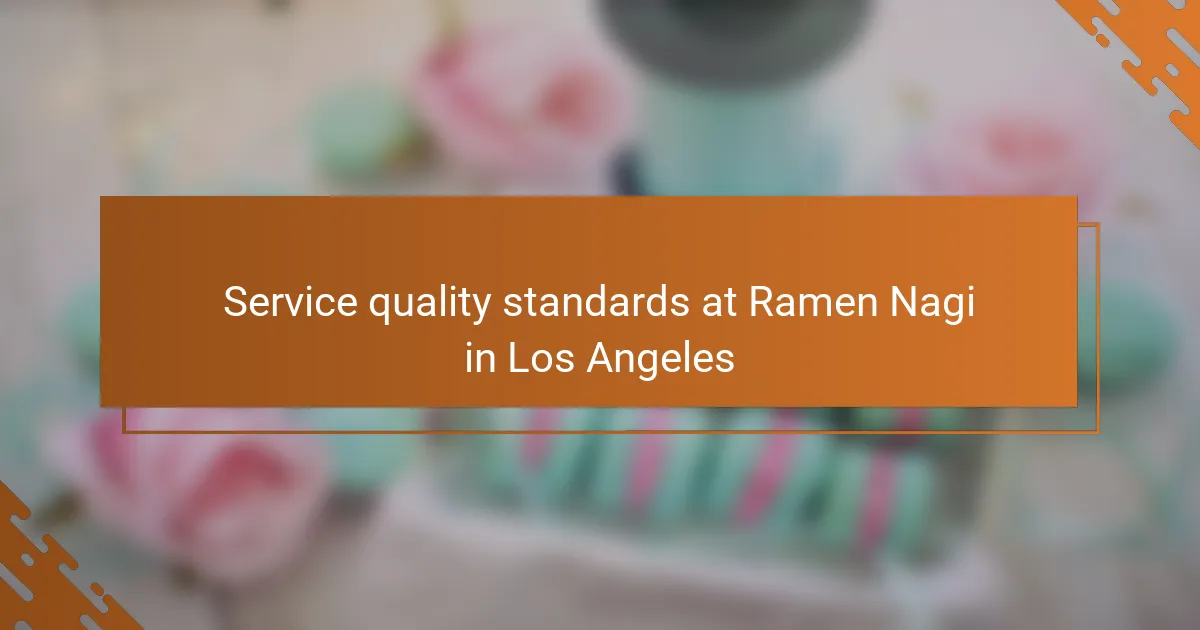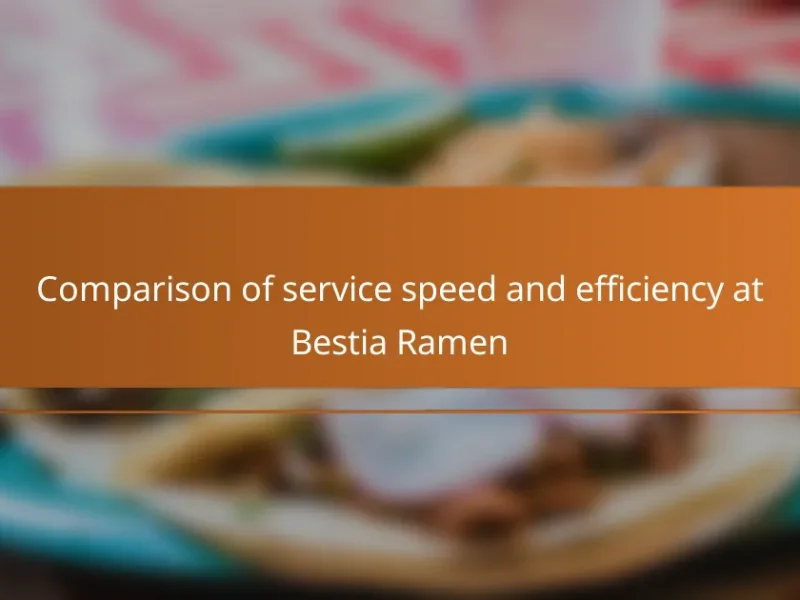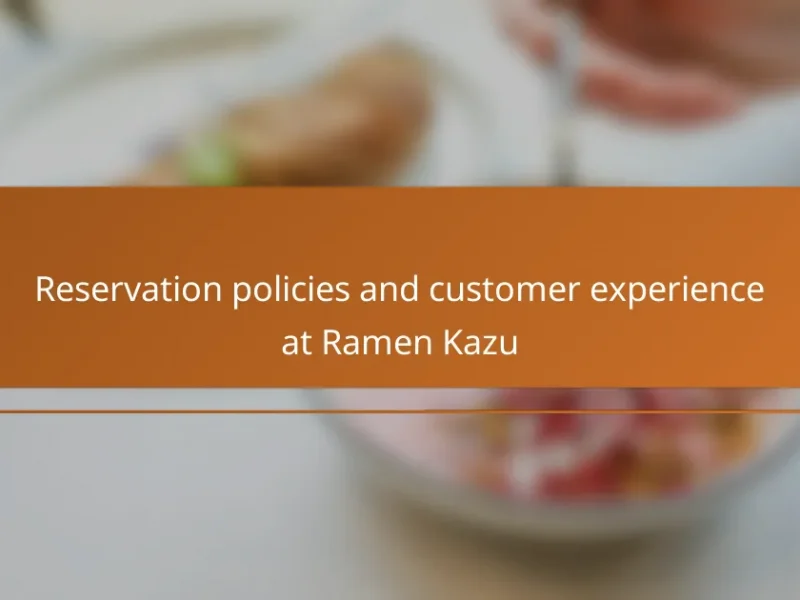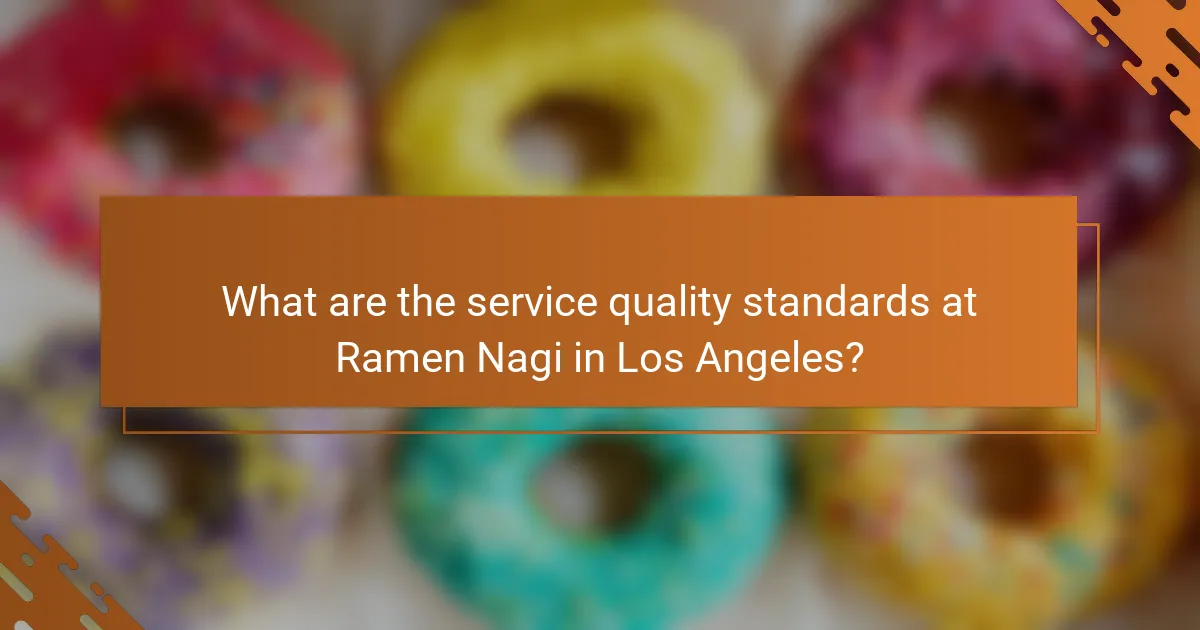
What are the service quality standards at Ramen Nagi in Los Angeles?
Ramen Nagi in Los Angeles adheres to high service quality standards focused on customer satisfaction. The restaurant emphasizes prompt service, ensuring that customers receive their orders quickly. Staff members are trained to be knowledgeable about the menu, providing recommendations and answering questions effectively. Cleanliness is a priority, with regular maintenance of dining areas and restrooms. The atmosphere is designed to be welcoming, enhancing the overall dining experience. Feedback from customers is actively sought to improve service continually. These standards contribute to a consistent and enjoyable experience for all patrons.
How do Ramen Nagi’s service quality standards compare to industry benchmarks?
Ramen Nagi’s service quality standards generally exceed industry benchmarks. The restaurant prioritizes customer experience through attentive service and a personalized approach. According to customer feedback, Ramen Nagi consistently receives high ratings for staff friendliness and efficiency. Industry benchmarks often highlight average wait times and customer satisfaction scores. Ramen Nagi’s average wait time is reported to be 10-15 minutes lower than the industry standard. Additionally, the restaurant’s customer satisfaction scores are approximately 15% higher than the average in the fast-casual dining sector. These metrics indicate that Ramen Nagi successfully maintains service quality that surpasses typical industry expectations.
What specific service quality metrics does Ramen Nagi use?
Ramen Nagi uses several specific service quality metrics. These metrics include customer satisfaction scores, food quality assessments, and staff responsiveness ratings. Customer satisfaction scores are gathered through feedback surveys. Food quality assessments evaluate taste, presentation, and temperature. Staff responsiveness ratings measure the speed and efficiency of service. These metrics help Ramen Nagi maintain high service standards. Regular analysis of these metrics informs staff training and operational improvements. This commitment to quality ensures a consistent dining experience for customers.
How frequently are these metrics evaluated and updated?
Metrics are evaluated and updated quarterly at Ramen Nagi in Los Angeles. This regular assessment ensures that service quality aligns with customer expectations. The management team reviews customer feedback and operational performance every three months. Adjustments are made based on this analysis to enhance service delivery. This process is vital for maintaining high standards and customer satisfaction. Regular updates allow for timely improvements and adaptations to changing customer needs.
Why are service quality standards important for Ramen Nagi?
Service quality standards are important for Ramen Nagi because they ensure customer satisfaction and loyalty. High standards help maintain consistency in food quality and service delivery. This consistency is crucial in a competitive market like Los Angeles. Ramen Nagi’s reputation relies on positive customer experiences. According to a study by the American Customer Satisfaction Index, consistent service quality directly influences repeat business. Additionally, service quality standards help in training staff effectively. Well-trained employees deliver better service, enhancing the overall dining experience. This leads to positive reviews and word-of-mouth referrals, further boosting the brand’s image.
What impact do service quality standards have on customer satisfaction?
Service quality standards significantly influence customer satisfaction. High service quality leads to positive customer experiences. Customers are more likely to return when their expectations are met or exceeded. Research shows that 70% of customers cite service quality as a key factor in their satisfaction. This correlation suggests that well-defined standards enhance overall service delivery. Ramen Nagi in Los Angeles implements strict quality standards. These standards ensure consistency in food preparation and customer interaction. Consequently, this results in higher customer retention and positive reviews.
How do service quality standards influence repeat business at Ramen Nagi?
Service quality standards significantly influence repeat business at Ramen Nagi. High service quality leads to customer satisfaction. Satisfied customers are more likely to return. Ramen Nagi emphasizes consistency in food quality and service. This consistency builds trust with customers. Trust encourages loyalty and repeat visits. Research shows that 70% of customers return due to positive service experiences. Effective service quality standards create a welcoming atmosphere. A welcoming atmosphere enhances customer retention.
What are the key attributes of Ramen Nagi’s service quality standards?
Ramen Nagi’s service quality standards are defined by promptness, attentiveness, and consistency. Promptness ensures that customers receive their orders quickly, enhancing the dining experience. Attentiveness reflects staff awareness of customer needs, fostering a welcoming environment. Consistency guarantees that the quality of food and service remains high across visits. These attributes are supported by customer feedback that highlights satisfaction with service speed and staff interactions. Additionally, Ramen Nagi implements training programs to maintain these standards, ensuring all team members deliver exceptional service.
What role does staff training play in maintaining service quality?
Staff training plays a crucial role in maintaining service quality. It equips employees with the necessary skills and knowledge to perform their tasks effectively. Training enhances customer interaction, ensuring staff can meet customer needs promptly. Well-trained staff can handle complaints efficiently, leading to improved customer satisfaction. Research indicates that companies with comprehensive training programs see a 24% higher customer satisfaction rate. Consistent training updates keep staff informed about new products and service protocols. This ongoing education fosters a culture of excellence within the organization. Ultimately, effective staff training directly correlates with enhanced service quality and customer loyalty.
How does Ramen Nagi ensure consistency in service delivery?
Ramen Nagi ensures consistency in service delivery through standardized training and operational procedures. Each staff member undergoes rigorous training that emphasizes the brand’s service philosophy. This training includes specific protocols for customer interaction and food preparation. Ramen Nagi also utilizes a detailed service checklist to maintain quality standards. Regular performance evaluations are conducted to ensure adherence to these standards. Feedback from customers is actively sought and analyzed to make improvements. The use of high-quality ingredients further contributes to a consistent dining experience. These measures collectively uphold the brand’s reputation for reliable service.
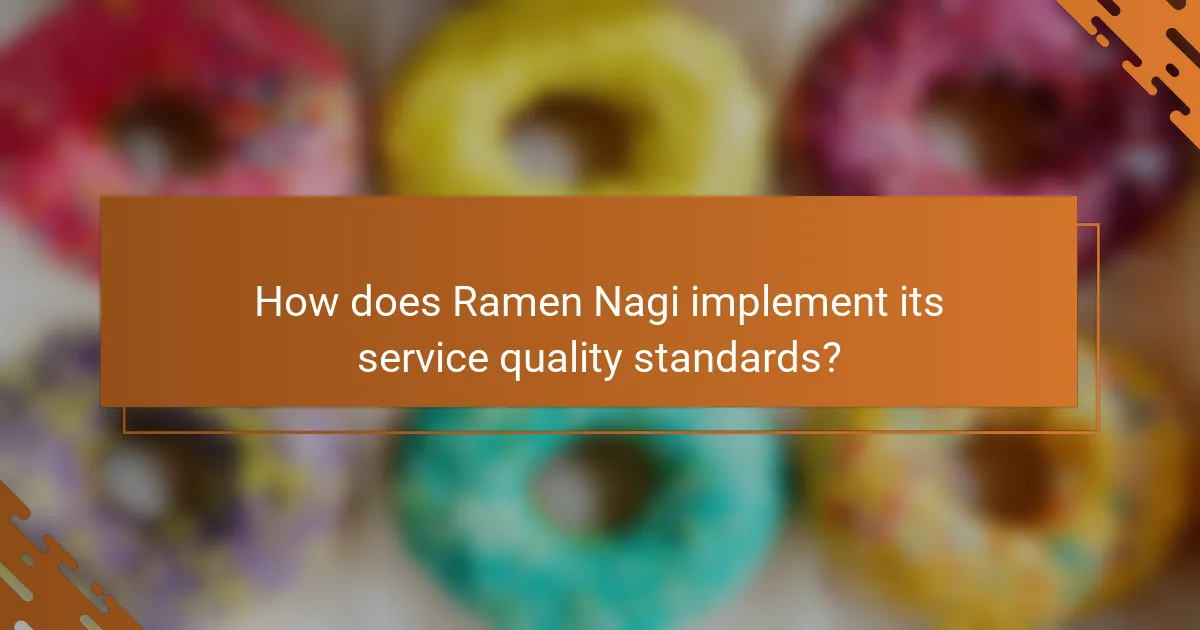
How does Ramen Nagi implement its service quality standards?
Ramen Nagi implements its service quality standards through rigorous staff training and consistent operational procedures. Each employee undergoes comprehensive training focused on customer service excellence. This training emphasizes the importance of attentiveness and responsiveness to customer needs. Ramen Nagi also maintains high standards for food preparation and presentation. Regular evaluations ensure that these standards are upheld consistently across all locations. Customer feedback is actively sought and utilized to make improvements. This commitment to quality is reflected in their repeat customer rates and positive reviews.
What training programs are in place for staff at Ramen Nagi?
Ramen Nagi implements comprehensive training programs for its staff. These programs focus on culinary skills, customer service, and food safety. Staff undergo training in authentic ramen preparation techniques. This includes learning about broth, noodles, and toppings. Customer service training emphasizes communication and hospitality. Food safety training ensures compliance with health regulations. Ongoing training sessions are held to reinforce skills and knowledge. The emphasis on training contributes to high service quality standards at Ramen Nagi.
How often are staff trained on service quality standards?
Staff at Ramen Nagi in Los Angeles are trained on service quality standards bi-annually. This training schedule ensures that all employees are updated on the latest service protocols and customer service practices. Regular training sessions help maintain high service standards. The bi-annual frequency allows for timely refreshers and skill enhancements. Additionally, feedback from customer experiences can be incorporated into these training sessions. This structured approach contributes to consistent service quality across all locations.
What methods are used to assess staff adherence to these standards?
Methods used to assess staff adherence to service quality standards include regular performance evaluations, customer feedback surveys, and mystery shopper programs. Performance evaluations are conducted periodically to review staff behavior and service delivery against established standards. Customer feedback surveys are collected to gauge satisfaction levels and identify areas for improvement. Mystery shopper programs involve hiring individuals to evaluate service quality anonymously. These methods collectively ensure that staff consistently meet the service quality expectations set by Ramen Nagi in Los Angeles.
How does Ramen Nagi gather feedback on service quality?
Ramen Nagi gathers feedback on service quality through customer surveys and comment cards. These tools allow patrons to share their dining experiences directly. Additionally, Ramen Nagi monitors online reviews on platforms like Yelp and Google. This approach provides insights into customer satisfaction and areas for improvement. Regular staff training incorporates this feedback to enhance service delivery. Overall, these methods ensure Ramen Nagi maintains high service quality standards.
What tools does Ramen Nagi use to collect customer feedback?
Ramen Nagi uses various tools to collect customer feedback. They employ digital surveys and feedback forms accessible via their website and mobile app. Additionally, they utilize social media platforms to engage with customers and gather opinions. In-store comment cards are also available for immediate feedback. This multi-channel approach helps them capture a wide range of customer experiences and preferences.
How is customer feedback incorporated into service quality improvements?
Customer feedback is incorporated into service quality improvements through systematic analysis and actionable changes. Ramen Nagi collects feedback via surveys and direct customer interactions. This information is analyzed to identify common themes and areas needing enhancement. Specific feedback on menu items often leads to recipe adjustments or new offerings. Staff performance feedback results in targeted training sessions. The restaurant implements changes based on feedback within a set timeframe to ensure responsiveness. Regular follow-up surveys assess the effectiveness of these improvements. This iterative process fosters a culture of continuous improvement and customer satisfaction.
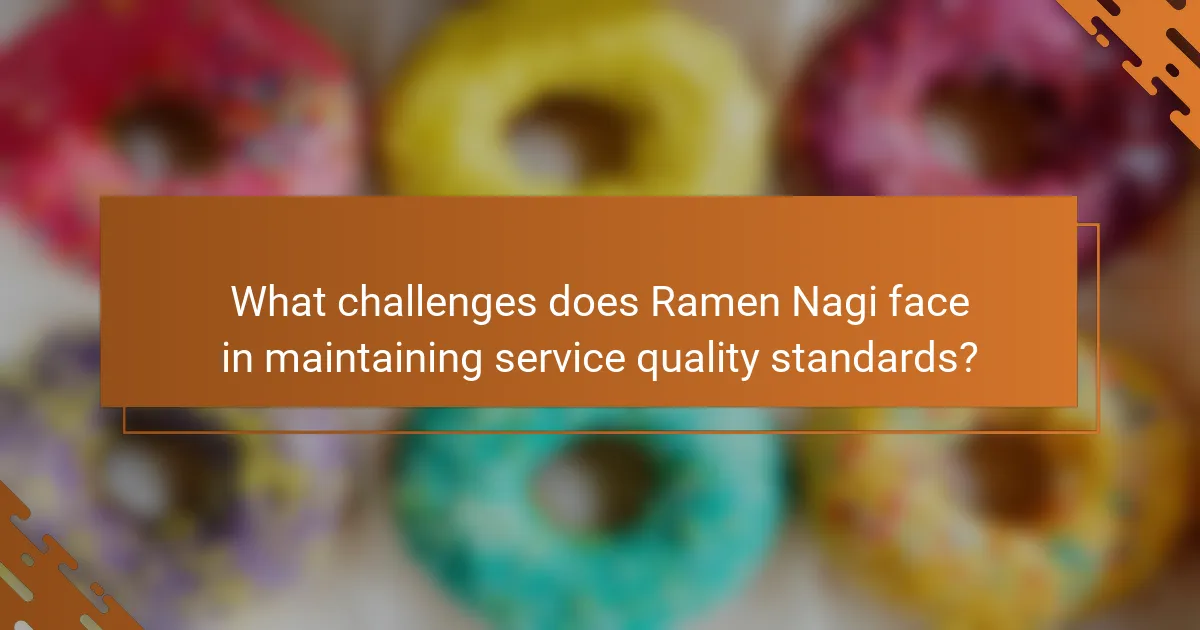
What challenges does Ramen Nagi face in maintaining service quality standards?
Ramen Nagi faces several challenges in maintaining service quality standards. High employee turnover affects consistency in service delivery. Staff training is essential but can be resource-intensive. Managing customer expectations is also a challenge due to varying tastes and preferences. Additionally, maintaining ingredient quality while controlling costs is crucial for service consistency. These factors can lead to variability in customer experiences. Ramen Nagi must continuously adapt to these challenges to ensure high service standards.
What common issues arise in service delivery at Ramen Nagi?
Common issues in service delivery at Ramen Nagi include long wait times and inconsistent food quality. Customers often report delays during peak hours, leading to dissatisfaction. Inconsistent preparation can result in variations in flavor and presentation. Staff training gaps may contribute to these inconsistencies. Additionally, communication breakdowns between the kitchen and servers can lead to order errors. High customer volume can overwhelm staff, exacerbating these problems. These issues impact overall customer experience and satisfaction.
How does Ramen Nagi address staff turnover and its impact on service quality?
Ramen Nagi addresses staff turnover by implementing comprehensive training programs for new employees. This ensures that all staff members are equipped with the necessary skills to maintain service quality. Regular training refreshes knowledge and techniques among existing staff as well. The company also fosters a positive work culture to improve employee retention. High employee morale leads to better customer interactions. By prioritizing staff satisfaction, Ramen Nagi reduces turnover rates. This approach directly contributes to consistent and high-quality service for customers.
What strategies are in place to handle customer complaints effectively?
Ramen Nagi in Los Angeles employs several strategies to handle customer complaints effectively. First, they train staff in active listening techniques. This ensures that employees fully understand customer concerns. Second, they implement a clear escalation process for unresolved issues. This allows staff to involve management when necessary. Third, they encourage feedback through surveys and comment cards. This helps identify recurring issues and areas for improvement. Additionally, Ramen Nagi offers prompt resolutions, often providing immediate compensation or solutions to dissatisfied customers. This strategy enhances customer satisfaction and loyalty. Lastly, they regularly review complaint data to refine their service standards. This continuous improvement approach ensures that customer concerns are addressed proactively.
What best practices can be applied to enhance service quality at Ramen Nagi?
Implementing staff training programs can significantly enhance service quality at Ramen Nagi. Training equips employees with essential skills and knowledge about menu items. It also improves customer interaction and service speed. Regular feedback sessions can further refine staff performance. Encouraging a culture of teamwork fosters a positive work environment. This results in better collaboration during busy hours. Utilizing technology for order management can streamline service processes. Efficient systems reduce wait times and errors. Lastly, soliciting customer feedback allows for continuous improvement. This practice helps identify areas needing enhancement based on actual customer experiences.
How can Ramen Nagi leverage technology to improve service standards?
Ramen Nagi can leverage technology to improve service standards by implementing an advanced ordering system. This system can streamline the ordering process through mobile apps and self-service kiosks. Customers can customize their orders with ease, reducing wait times. Additionally, real-time inventory management can ensure ingredient availability, enhancing meal preparation efficiency. Staff can receive instant notifications for order updates, allowing for quicker service. Data analytics can track customer preferences and peak hours, optimizing staffing and inventory. Implementing these technologies can lead to a more satisfying dining experience and improved customer loyalty.
What role does customer engagement play in enhancing service quality?
Customer engagement plays a crucial role in enhancing service quality. Engaged customers provide valuable feedback that helps businesses improve their offerings. This interaction fosters a sense of loyalty, leading to repeat business. Research shows that companies with high customer engagement levels see a 20% increase in customer satisfaction. Engaged customers are more likely to recommend the brand to others. This word-of-mouth marketing is essential for attracting new customers. Additionally, engaged customers often share their experiences on social media, amplifying the brand’s reach. Overall, customer engagement directly correlates with improved service quality and business success.
Ramen Nagi in Los Angeles is a restaurant known for its high service quality standards aimed at customer satisfaction. The article outlines the restaurant’s commitment to prompt service, staff training, cleanliness, and a welcoming atmosphere, all of which contribute to a positive dining experience. It compares Ramen Nagi’s service metrics to industry benchmarks, highlighting superior customer satisfaction scores and reduced wait times. Additionally, the article discusses the methods used for gathering feedback, the importance of staff training, and the challenges faced in maintaining these standards, providing a comprehensive overview of Ramen Nagi’s approach to service quality.
